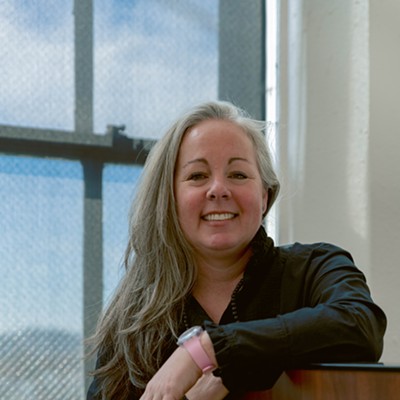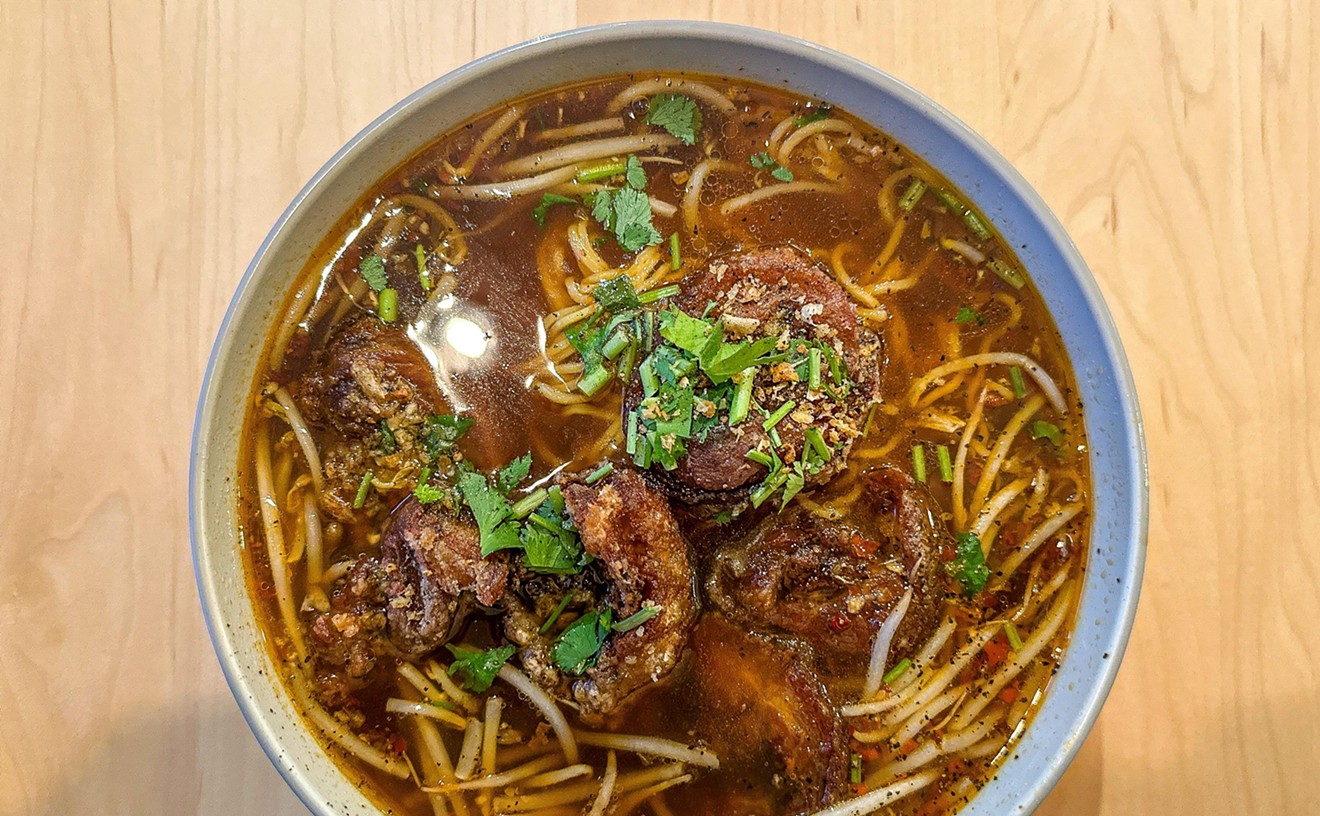Jason Maddy is the executive chef at the recently opened Oak in the Design District. Maddy grew up in Austin and, after attending culinary school in New York, worked at David Bouley's Danube, then the Driskill in Austin. A few years ago he was recruited by John Tesar to work at the Mansion, where he spent the past couple of years with Chef Bruno Davaillion.
We spoke to him as part of Three-Course Meal, our ongoing series of chef interviews.
When did you get into cooking? My mom was a great home chef. When I was home during the summer she'd call me and tell me to take ten eggs, put them in cold water, put on the stove and make egg salad. It started slowly like that.
What was your first job at a restaurant? I went through the whole fast-food chain thing. McDonald's was actually the first place. A bunch of my friends worked there too, so it was a riot. Then, from there I worked at IHOP, started as a server, then got back in the kitchen on the graveyard shift. Then, when I was in college I started working at Macaroni Grill and they offered me a spot as sous chef and that's when it became a profession for me.
At that point I wanted to get into fine dining, so I went to the CIA (Culinary Institute of American) in New York City.
Where did you externship? I worked for the Marriot in New Orleans and Baltimore. While I was in New Orleans, I did a lot of staging; one with Emeril and Susan Spicer (Bayona).
What about in New York City? I started with (David) Bouley at the Danube. Once Mario (Lohniger) left the Danube I took that over and ran that for a few years.
What did you learn from New York diners? They're really sophisticated. They know what they're looking for, have high expectations, and a superb knowledge of food. There's so much competition in such a small area it can be intense.
Did that atmosphere help you? It makes chefs really strong because you have to work in such small kitchens -- the spaces are so small. It's pretty crazy. Most New York restaurants have a basement where you do all your prep work, then small cook space upstairs. But it's also kind of fun because everyone is in the same situation. They're all very professional and the cooking is really high caliber. When you're surrounded by that you become part of it. It makes everybody better. How did you get to Dallas? I actually went to Austin first, where I worked with Josh Watkins and David Bull at the Driskill Hotel. I was there for three and a half years, then I came to Dallas to work at the Stoneleigh Hotel. Shortly after that, Tesar at the Mansion contacted me.
I was there for three and a half years. The first year and a half with Tesar and then Bruno [Davillion] came on, and I wanted to stay and work for him because he had so much to offer.
What did you learn from working with Chef Davaillion? He's a very controlled and meticulous person almost the opposite of the tyrannical chef. Genuinely a hard worker, but his techniques are classic and pretty old school. So, I was just trying to learn from that.
What do you mean "controlled?" He's very quiet, likes things his way, almost a complex person. He works his own way. But in terms of his management style and the way he works with other people, I don't consider him to be controlling or a forceful person. His kitchen is actually a really nice environment.
What did he teach you about leading a kitchen staff? It's all about technique and getting people into the right places and watching their technique. Just having everyone organized so they can flow in a very nice organized way. There's no chaos.
Do you try to create that here? Yeah, I brought Brian Zenner with me and we already had a good working relationship. He's kind of a west-coaster and I'm kind of an east-coaster, but there are not any conflicts because we're use to working in the same environment.
How do you create cohesion with the front of the house? I don't consider that the front part and that the back part, it all has to be one house. Everybody has their job to make the whole thing work right. If you get that separation then you have what's considered the two -team theory and I've never been into that. Also, when we were hiring and training here, I made sure to tell everyone that I'm a very open chef. I don't want anyone to ever be afraid to ask me a question. When they're standing in the kitchen waiting for a plate, we're always discussing the food.
How would you describe the Dallas dining scene? I think it's a classic city. Things that are good are going to stay because the diner knows what they're looking for. Dallas diners are sophisticated. It's a huge city and people travel to LA and New York a lot, so they know what they're looking for. They want quality and they understand value at the same time.
And that value is getting better. While the old institutions are always going to be here, we have a lot of younger chefs are filling in those gaps between chain restaurant and the high scale places. Like what Tim Byres has done recently and the whole Bishop Arts.
Do you think the Austin food scene is different than the Dallas scene? Extremely. Austin has changed so much, but it's unique because their dining scene is so laid back. I think it's more sophisticated here, people get a little more dressed up. There people are just much more laid-back. Austin is also really wrapped into vegetarian and vegan food. When customers dine out, they expect those options everywhere.
What are some of your favorite local places? I always try to hit new places. I really miss that York Street is not there anymore because it was right next to my house and we went there all the time. Recently I was really impressed with Marquee. I like sushi and love going to Tei-An and Teppo. Mostly it's something pretty casual, like the Libertine Bar; they have a really good bar menu.
Do you cook at home a lot? I try to. Home cooking for me is really very simple. I do a lot of pastas. I like to make sauces, stuff that is simple. When I go into a grocery story I go to the proteins and pick out a fish or meat, then on the way out I just start to pair things with it.
Where to you shop? The Kroger on Mockingbird is really trying to run with Whole Foods and Central Market. It's turned out to be a great store. The farmer's market is nice when it's in season.
Is there anything the Dallas food scene is lacking? I think it's pretty well rounded. My initial reaction was that it's all steak houses and these grand institutions. But, there's been so many nice places opening up and falling in place. Here you can avoid the chains and find a great place.
However, I'm always looking for better fish in town. The market is pretty good, but it's so expensive. That's what I really miss about the east coast; you just walked up to the fish mongers places and get great fish. Here people get it, but it's just so expensive. Instead of making fish a designer item, I wish it was more accessible for everyone. The mark-ups are through the roof.
If someone were to go to the Mansion to eat, what would you recommend? If it's a really special occasion, the chef's tasting menu or specials menu are definitely the way to go because he's preps all that by himself. The tasting menu in the old library is really special.
What do you think about the locavore movement? I try to support it. I work with Rocky with Tassione Farms, they come out twice week. He has a big farm out in Stephenville and he texts me like at six in the morning twice a week and tells me what he's got and I tell him to bring it on.











